Dear Friends
I was actually glad the blizzard started again. Driving wind, gusting to something around 50 miles per hour blasted horizontal snow in my face. Upwind, I could barely hear the wolves howling. At least Melanie and Abby wouldn’t hear them again. They were buried under a mountain of loose clothing in my truck.
When the big dogs howled earlier, the kids worried. They worried in their exhausted state that they would watch their dad get ripped to pieces by a pack of the massive wild canines in the headlights of the truck. Now, with the snow-squall blasting, the wolf-chorus would never reach their ears.
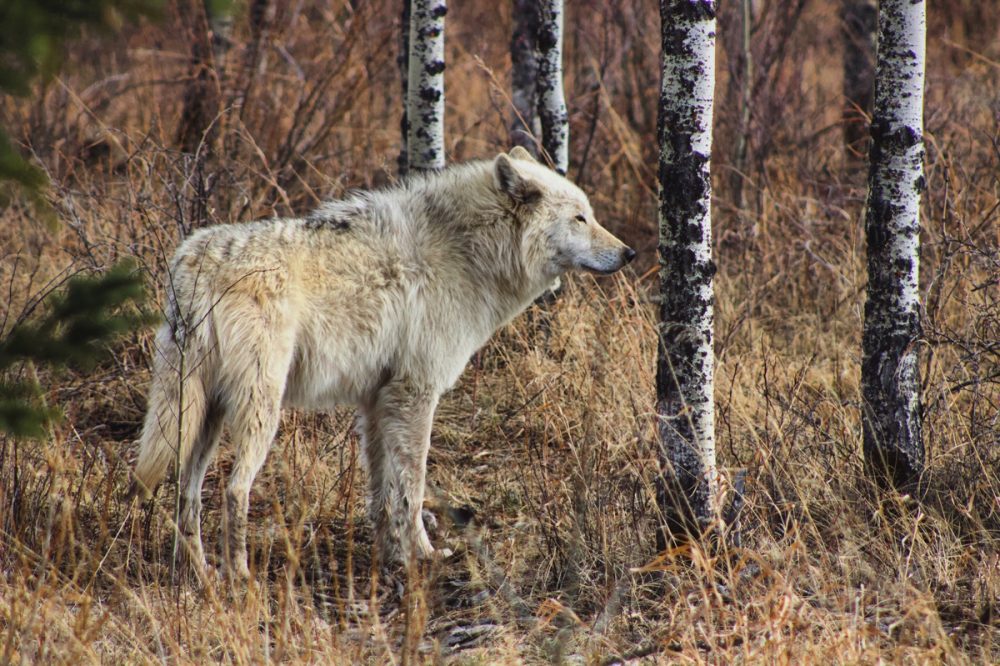
Keep digging. Actually, it was kicking and groveling with my gloved hands. I had no shovel.
It was the only thing I could do. I checked my phone: 2:53 AM.
I kicked another boot-full of the frozen crust with my Sorel arctic pacs, and got down on my hands and knees to see if I had made any progress at all, reaching under the 1993 Chevy, to feel with my hands what I was hoping would be a void of open air or fluffy snow.
None whatsoever. White concrete.
It was time to start the truck.
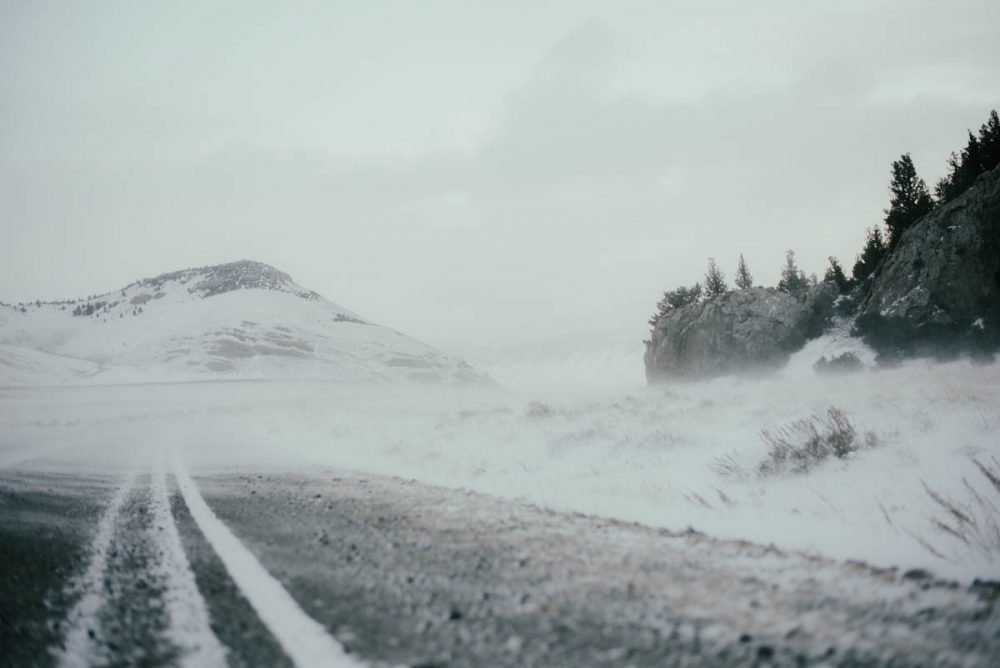
I started it periodically to blast the heater and warm my extremities, and keep my girls from freezing. It wasn’t too bad in the small cab of the truck. Sure it was chilly, but not the zero degrees outside, with a handy wind chill tacked on it. Outside, with the wind-chill, I bet it was as cold as 25 below zero. Inside the cab, it was probably in the mid-forties, and with me starting it off of an already warm engine every half hour or so, it never got really too cold. I didn’t dare to leave it run or to doze off. Drifting snow could easily block exhaust flow out the tailpipe and cause the unthinkable consequences of carbon monoxide buildup.
It’s why I though I had better just keep on digging. As long as I could keep my hands and feet from frostbite.
The truck easily cranked to life, and I turned on the headlights. Blizzarding snow characteristic of whiteout conditions filled the headlights in two horizontal shafts that ended in darkness. To my extreme disappointment, the two-track trail I had dug out with my feet and hands back to the roadway had almost completely drifted in. I stuffed my frustration, and turned on the domelight and pulled coats from the girl’s heads.
They squinted in the light as they stirred. “Are you OK?,” I asked.
“Yes, Dad. Are you?,” Melanie asked.
“Yeah, I’m good. I just came in to warm up and check on you kids.”
“Any progress?,” asked Abby.
“Yeah. I’m making good progress.”
“Any wolves?,” she asked.
“No. No wolves.” I smiled, and she returned a sleepy grin.
“Go back to sleep you two.” I pulled the coat back over them, and they stirred little.
Hands warm. Gloves warm. Feet warm. Time to keep digging. Or kicking, rather.
I shut off the truck and the headlights, and headed out. Thankfully, the wind had abated. Perhaps now I could make some serious progress. I was really hungry, and was burning calories like no tomorrow.
The Little Lost highway was the quickest way from Alderspring Ranch to a large town: Idaho Falls. It was about two and a half hours this way, and about 3 hours if you went around the mountains on better roads through the mountain community of Challis. We used this short cut often during the summer, and in the winter, it was usually plowed all the way through over Summit Creek, the 6800 foot height of land between our valley, the Pahsimeroi, and the Little Lost. Two arrow straight parallel mountain ranges bounded these two valleys for over 130 miles. The pass road over the summit is the only way to connect the valleys by road.
The same travel-way was used by Shoshoni natives for thousands of years. In fact, Caryl and I have found tipi rings, the telltale circles of stones that these indigenous peoples used to anchor the bases of their lodges down near springs in protected campground areas along this main road down the valley. Flakes of obsidian littered the ground as well, indicating that Shoshoni hunters spent time there flint knapping arrowheads for the abundant game that used the same routes.
This night, I had left Idaho Falls late in the afternoon. The girls came with me for a parts run for an irrigation pump, and to help with some grocery shopping. They were used to traveling in winter, and packed plenty of extra clothes. In the Idaho mountains, one never knows. I remember one friend of mine, Dallas, who was stuck in a snowdrift in his mini-van with his whole family for 3 days on a mountain pass in the next valley before someone came that could pull him out. Thankfully, they had adequate food and clothing to make it without freezing to death in the wind driven subzero cold.
My truck was a high clearance 4-wheel drive ¾ ton Chevy with lug tires on it. In addition, I had tire chains for all four wheels if things got bad. It would be really hard to get stuck driving this rig, I remember thinking as I made the turn up the broad valley at the Howe post office (it’s all there is of the town besides the tiny elementary school).
Most of the road was pot-holed yet paved, and its narrow and shoulder-less surface usually plowed by the Butte county road departments every few days or so. In midwinter, the dirt track pass road only saw a plow once every week or two, as it was only barely maintained volcanic ash and rock for about 25 miles, and there was nobody living up there. It was just a broad sagebrush valley, bounded by big, austere and snow capped mountains as far as you could see.
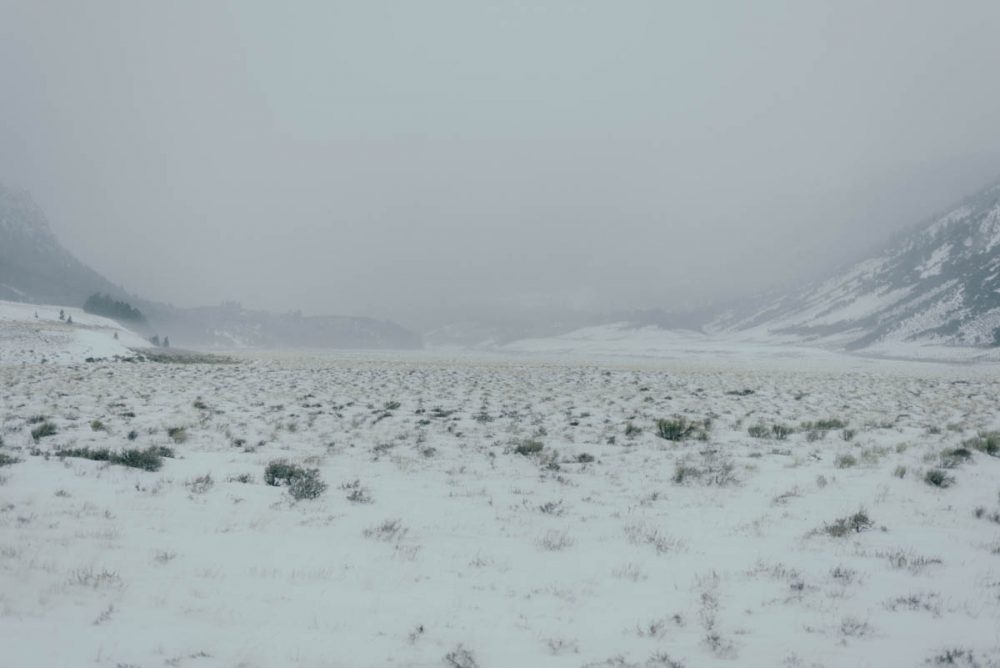
And that was part of the problem. You see, I knew there was no-one up there, but on decent roads, it shouldn’t be a problem in itself. The problem was that the road only saw a few travelers a day, if that. I’m sure some winter days go by where not one vehicle uses the road. After all, in the 130 miles of connected valley, there’s only about 500 inhabitants on ranches over all of those miles.
And to my way of thinking about how scattered valley ranches were, it seemed that the census of five hundred souls must have included cow dogs.
And that sparse population figure niggled at me as the light faded. In addition, I noted that it looked like the top of the valley was in a snowstorm, as indicated by thick clouds that obliterated the setting sun. I made one last call to Caryl just out of Howe, Idaho, as I knew that was the end of service until I reached the Pahsimeroi.
She didn’t pick up. I left a message: “Honey, I’m heading up the Little Lost. I should see you around midnight tonight. The girls and I are fine.”
I could see pavement in my headlights in the twilight. Occasional lights of cabins and ranch houses along the way in the remote Little Lost broke the oncoming black. And then, they began to be lesser, as habitation became less and less as we proportionate to the gained altitude, slowly, but surely up the long grade to Summit Creek, which some will say is the land of Never Summer. It’s short summer, for sure. But not never, I thought.
The bang of a cattle guard marked the transition to dirt and the beginning of snowfall. At first, it was easy going. We were clipping along at 55 or so, despite the snow covering on the dirt road and the obvious edges of the roadway.
But then, the wind started. And the snow no longer fell; it swept across the headlights back and forth in seeming cadence with my windshield wipers. Our speed slowed to 20 or so mph, and it became hard to see the edges of the road. There were no reflectors or markers along the edge; all you had to look for was the slight difference from the flat of the road versus the edge of the graded dirt where it transitioned into sagebrush.
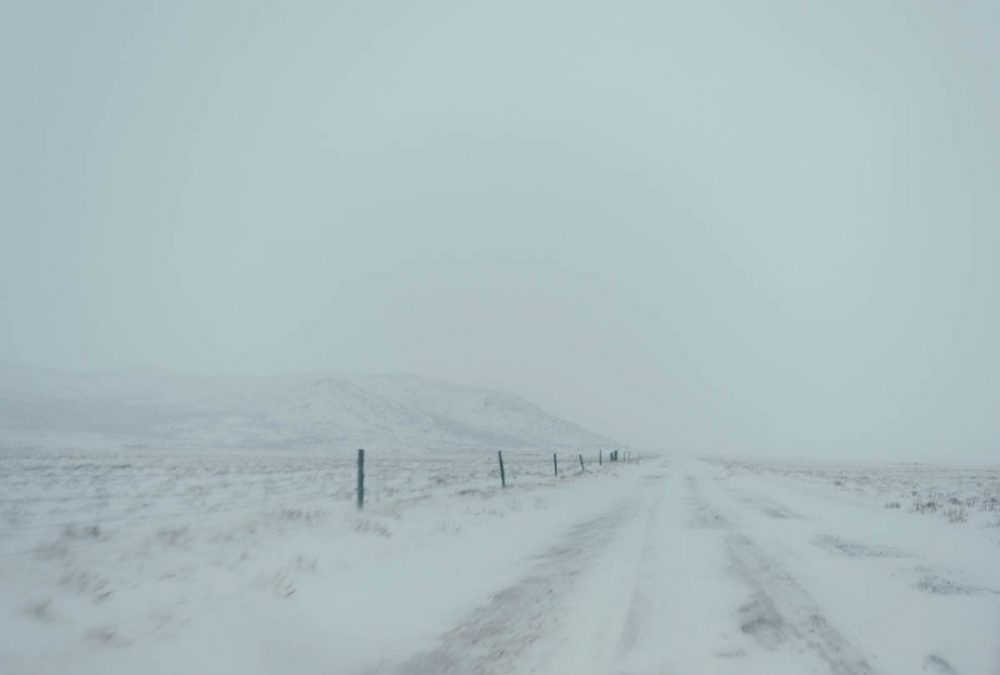
We slowed to 5 or 10 mph.
“We’ll never get home at this rate, Dad,” Abby stated.
“I know. But I sure don’t wanna get sucked into the soft stuff along the sagebrush there.”
We made it through the first curves I remembered, and then the map in my head unrolled to reveal the memory of a long straight stretch of several miles that led up to Barney Hot springs.
No more tire tracks. The road was blown white on white. Nothing. I resisted the urge to stop, as I clicked on the 4 ways. Someone coming from behind would never see us until a split second before impact, and any forward motion would lessen the chances of said wreck.
While focusing on straight, I reminisced about warmer days at Barney. The spring holds at 70 to 90 degrees year round. It is a pond, really, about 50 feet long by 25 feet wide, stuck out in the middle of the sage—in the absolute middle of nowhere. I mean, there is nothing out there. You can see for 20 or 30 miles in any direction, and there is not one sign of human habitation. Just wide-open views at any compass point, bounded by snow streaked 11,000 foot peaks jutting their rocky ramparts to the sky.
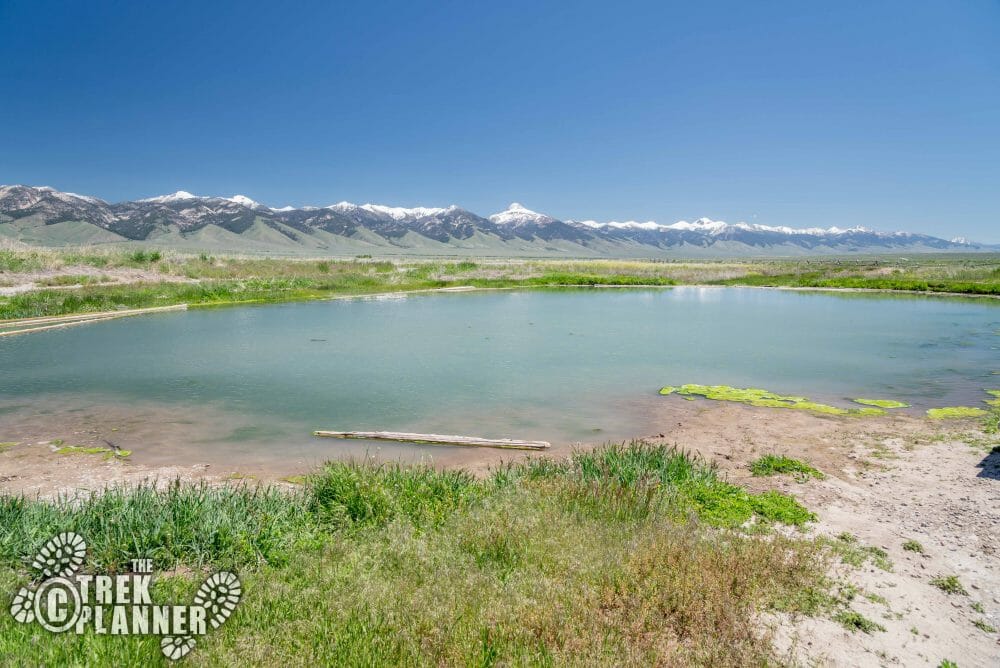
We’ve gone swimming there in the summer. The only disturbing thing is if you stop swimming, the fish start nibbling. At your feet. Or your legs. Even your hands.
And they’re not normal fish. They are tropical fish. Blue ones, orange, white, green and brown. Angelfish, guppies, big goldfish looking ones. And bigger white ones that stalk in the murky depths, ghost-like. I appreciate their shyness, in particular. If they bit, they’d do some damage.
I guess years ago, people stocked them with their unwanted aquarium fish when their kids left for college. They’ve been there for as long as I can remember—probably 35 years.
In summer, most folks feed them when they go by on the dirt track of the Lost River Highway. People stop and shake out their bags of Doritos or Lays potato chips. We have.
The kids giggle and laugh at the feeding frenzy and the boil of the water as the fish rip away at the treats. And they go swim with the tropicals. Caryl and I laugh that we may never get to go snorkeling in tropical seas, but who needs to when the fish came to you in Idaho’s high desert?
Besides: we have better scenery. And there’s no people on this beach.
Especially now. Back from the tropics to the sub-arctic. The snow became a featureless monotype, and it was all I could do not to get wooed by the way the flakes were falling. They were hypnotic. Worst of all, there was no knowing where you were. I felt the dirt road under my tires and didn’t feel any edges at 5 mph.
There. I felt the edge and pulled back up on the travel way. Good to go. There it was again. Back up again. And then after another few minutes of uneventful creep at 5 to 10 mph, the truck lurched to the right, deeply sucked down into a sort of hole–from a badger perhaps? Then it dramatically pulled the truck off-road into the deep white. I punched the gas and cut the wheel to correct, but too little too late. The truck lurched to a stop as all four wheels spun hopelessly.
Headlights illuminated endless tundra-like white and the occasional tuft of sagebrush that graced the surface of the snow, shivering in the incessant wind.
I rocked the truck back and forth from forward to reverse. No luck.
“Are we stuck, Dad?,” asked Blondie. It was one of my nicknames for my towheaded 9- year old.
I looked over at both of them, buckled in and wide awake. “Yep. We sure are. Let me jump out and check out the situation.” It took a minute to see that it was bad. The wheels weren’t even close to the surface of the dirt under all that snow. The entire truck was perched on a platform of compressed snow, where it had tobogganed to a stop. We were major stuck.
I turned the key off to save gas, flicked the dome light on, shut the door, and made a plan. My only hope was to excavate the snow from the entire undercarriage and get those wheels on the frozen soil surface. Maybe then, if I trenched out paths in the snow back to the road, and chained up all four wheels we would have a shot out of this mess.
The desperate fact about the Little Lost is that there might not be anyone coming by for days. And with no cell service, it was up to me. I checked the gas gauge: half. I figured if I started it for a few minutes every half hour to keep the kids warm, I should be good for a day or two. And we just bought groceries. Much of it was in cans, but we could build a fire from sagebrush we dug up and make due.
And then the howling started. They were a long ways off, but still loud enough to hear. First one of the big canines started up in solo. Mournful. Then, a chorus followed lead. The Little Lost Mass Choir.
Abby knocked on the window and rolled it down. She asked first. “Are they coming here Dad?”
“It don’t sound like they’re moving Scootie.” It was another nickname for the happy towhead. “I think they’re smart enough to stay by the timber up along the mountains in this weather.”
Melanie sounded off next (she was 10). “Do you need help, Dad?”
“No. I think I’ll get it. You kids just grab a bagel and some water—I’ll start digging. And get yourselves set up to sleep. We might be awhile.”
“OK Dad.” They both managed a smile as the window rolled up. Powered by Abby, anxious to get the blowing snow and wind off her face.
It took most of the night, but I finally was ready for a test drive. I could see the flashlight glow I left on the other side of the truck all through the undercarriage of the vehicle. The tires were chained up, and tightened with baling twine. I checked the time: 5:30 AM. The wind had finally abated, and the snow was letting up. It was still black with a midwinter long night. It would be close to 7 by the time we saw daylight.
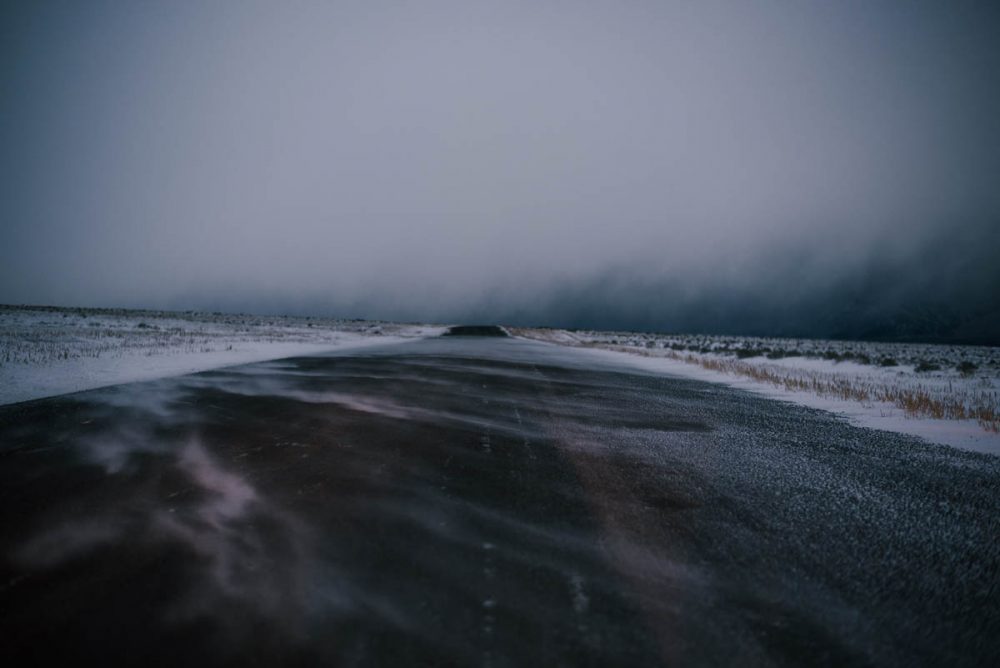
I fired up the old and reliable 350 V-8, and slipped the truck in gear. The girls sat up and peered through the windshield at the still slowly falling flakes. In the headlights, our path that we were to take was clear: the trenches I had hacked out of the frozen snow with my exhausted feet and hands looked deep and wide enough—and long enough to get us back to the road in about 80 feet.
And then we prayed. The girls were awake and closed their eyes. Mine were wide open, looking at what might be a hopeless situation, but I had to ask anyway. “Lord, please get us outta here. I don’t know what else to do. We’ve done our best. Amen.”
We stared for a moment at the slowly falling snow. “You ready to go home, girls?” They nodded wordlessly in the dim light off the dash instruments.
“Well, hang on.” I eased into the accelerator so that I wouldn’t spin my chains off. There was a lurch, and then another lurch as chains took purchase on sage and dirt beneath the snow. And as they did, I was able to turn lurches into continual movement, and gave more gas as I could without spinning. In just 20 feet, we were still in my trenches and clipping along at a lusty 5 mph.
Then 10 mph, and 15, and the truck made an uphill thrust back onto the road surface!
We were so grateful. The girls grinned. I jumped out and pulled chains. And without the wind and the driving snow blizzard, we could see the smooth untracked surface of roadway and the banks of snow bounding it that the plows had left several days prior. There were drifts to bash through, to be sure. But at least we could see our way forward.
We could go home.
We arrived at Alderspring happy and tired, just as the light of dawn was lighting the Eastern sky. Looking back toward Summit Creek, I noted that it still had the cloud of a blizzard upon it (it often does), but our day 35 miles down valley would dawn clear.
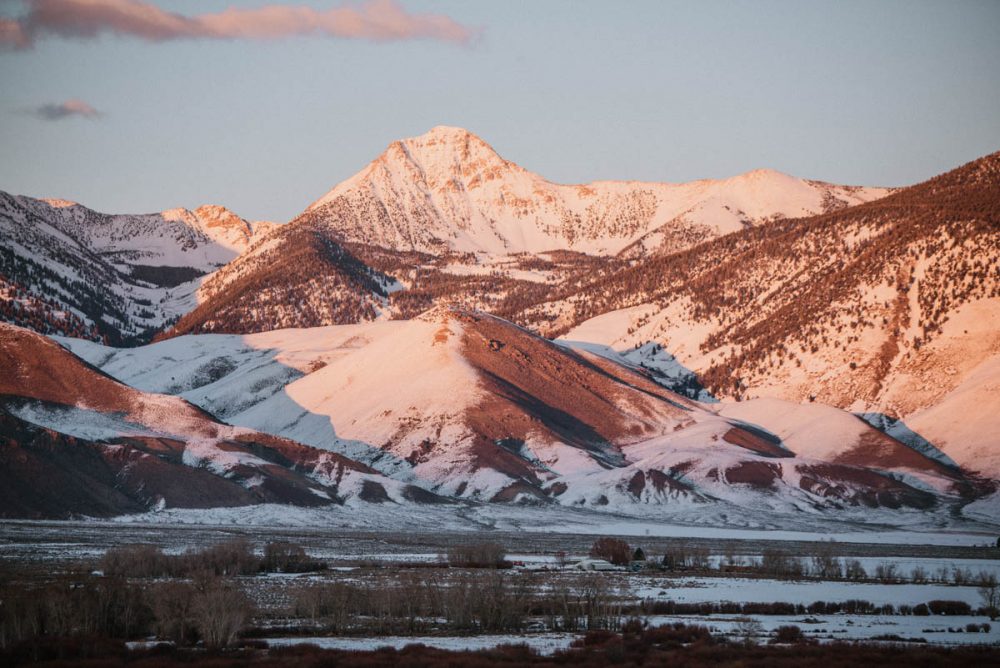
Caryl was expecting us, as I called her when we broke back into cell contact an hour or so ago. She was figuring on sending help if we didn’t show up.
Some lessons come easy when you ranch. Others come with some skin in the game. All I had to show for this one were blistered feet and hands. But somehow, you move forward, and thankfully learn from that hard knocks University.
I asked Caryl a couple of months ago if we should go over Summit Creek when we were planning a trip in January to Idaho Falls. “Weather forecast says it’s supposed to be just cold and clear,” I said. “And George Miller just went over it a day or so ago. He said it was good. It’d save time from going around the mountains through Challis.”
Caryl thought for a very short moment and simply said, “No. I’m thinking we could stop and get a cup of coffee if we went around the mountains through Challis. That Village Inn has that new coffee window. I was kinda looking forward to a cup.” She smiled the same grin that first attracted me to her.
Sometimes marriage has in it the best examples of diplomacy. The world should take notes.
Happy trails.
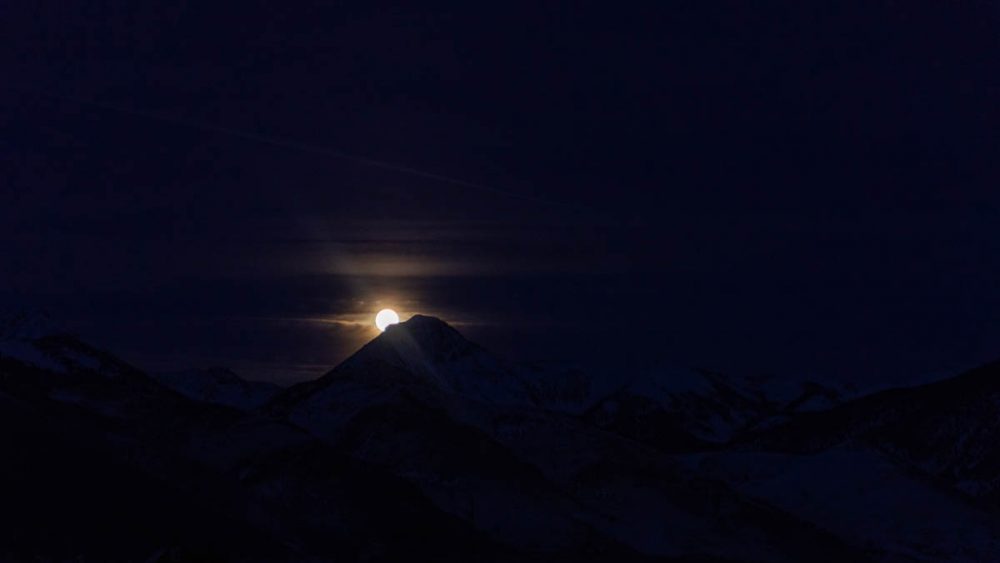


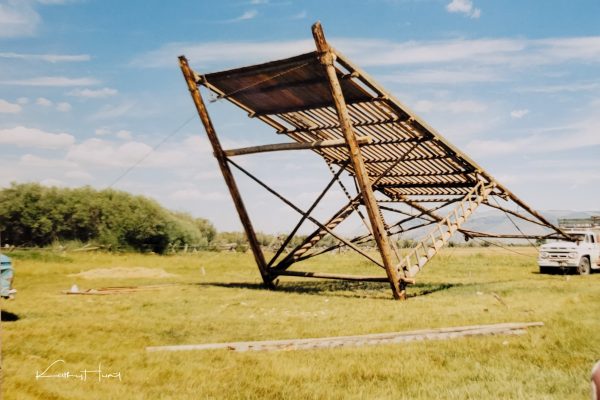

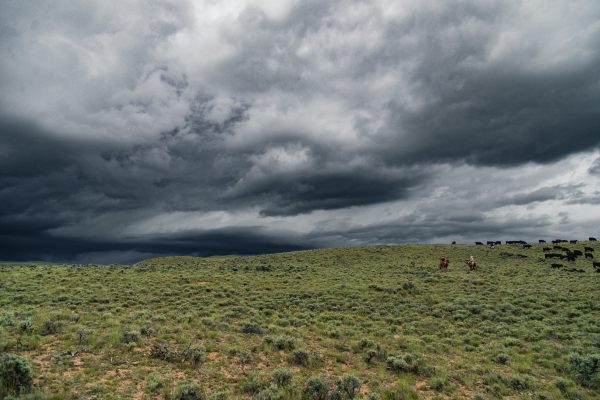

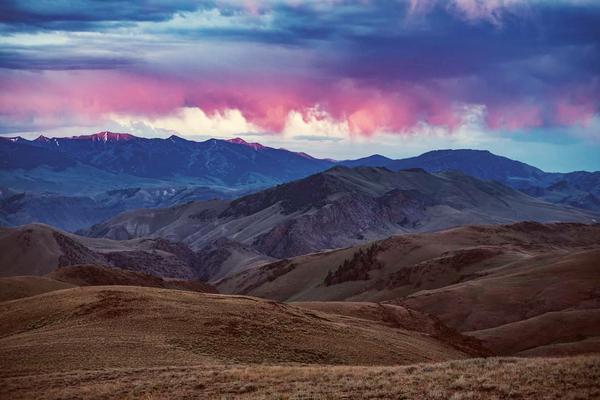
Jeff Zaremsky
A little bit of a tangent from this snow story, but the section about the hot spring reminded me of the hot springs just outside of Salmon that we went to when we worked together, and then again when Barbara and I visited you. I don’t remember if it has a name, but it is a hot spring running down a mountain next to a cold spring. Some pools of water from those two springs are hot, some are cold, some are just right where the two streams come together. I have some pictures of our time up there, but I don’t see how to include it here. I will have to email them to you.
Glad you and the girls got out of the snow and cold. I’ve been stuck in it and don’t miss it a bit. I hope heaven has warm snow.
Glenn A. Elzinga
Jeff! So good to hear from you!
The springs you have got to be remembering are the Elk Bend Warm Springs, now called Goldbug Hot Springs. Their use has gone pretty viral, as there is much mention of them online. I’m certain if you googled it, you’d find a lot of reference to it…and pictures as well.
The time you and I used to go there was precious, when there were little to know folks who knew about it!
Great memory! I proposed to Caryl up there!
Glenn
jeff
Yes, that’s it Elk Bend. That is neat that you proposed to Caryl up there. Perfect place.
Wow, there a lot of pictures of it today and videos with drones. Some, professional tourist/hikers types said it was the best they have ever been too. Bridges, a toilet, steps, and sometimes crowded. A lot of changes.
I dug out the picture book and found a few pictures of a couple of our trips up to the springs. I will scan them and email them to you.
Also of white watering on the Salmon River, swimming in the pacific, Caryl and me trying to reach around a redwood, a hike up trapper peak, and also Bridger Wilderness. I have one of your mini-station wagon.
What I don’t have, but remember, was a camping trip a bunch of us took up to a lake that was surrounded by snow. We slid down the snow on our butts right into the cold water.
Shirley
I really love your weekly stories. They read like short novels! This one reminded me of how hard my dad worked on our farm and how we never realized it until many years later. Farmers/ranchers are such determined, resourceful, ingenuitive folk. Thank you for sharing your “episodes†from ranch life in an articulate, endearing and sometimes suspenseful manner!